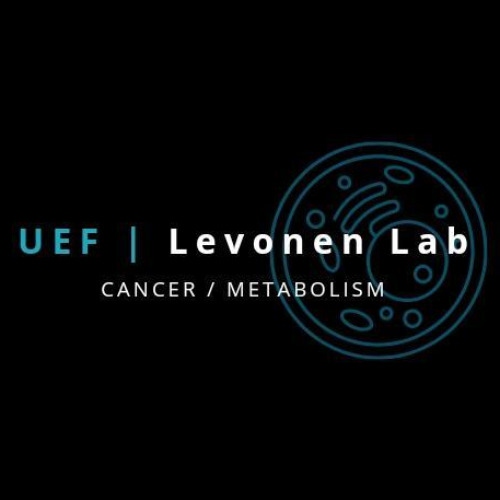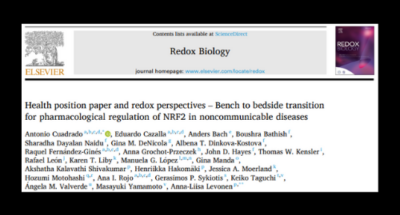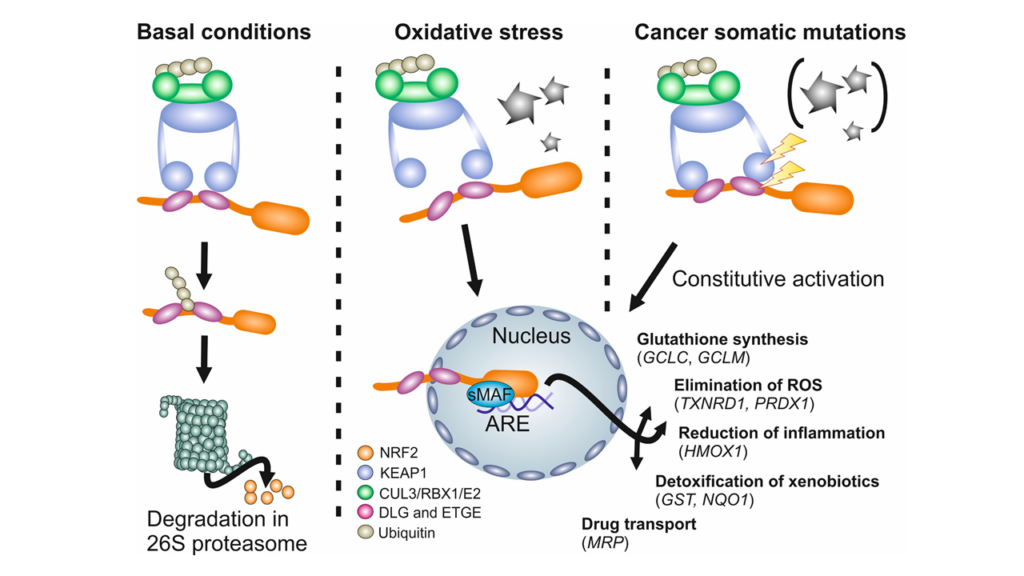
Mechanisms of cancer and metabolic disease (Levonen Lab)
Leaders
Levonen Lab focuses on two major research topics: cancer and metabolic diseases.
In Professor Anna-Liisa Levonen’s research group, we explore the dual role of the NRF2 transcription factor in cancer, with a particular focus on lung cancer. Additionally, we investigate metabolic diseases, emphasizing NRF2’s role in metabolic regulation and the detrimental metabolic effects of environmental toxicant exposure.
News
-
 Levonen Lab is on LinkedIn!
Levonen Lab is on LinkedIn!Levonen Lab is on LinkedIn!
-
 New publication!
New publication!New publication!
Check out our latest publication in Redox Biology!
Projects
-
Redox Signaling
Reactive oxygen and nitrogen species (ROS and RNS) and products from their reactions with cellular macromolecules play a significant role in the development of cancer and cardiometabolic diseases. Cells have developed intricate mechanisms by which they respond to ROS and RNS, thereby balancing their effects in cells and tissues. The protective effects are mediated by transcriptional responses to restore cellular homeostasis. The key mediator of cellular protection against ROS and RNS is transcription factor Nrf2, which regulates the expression of numerous protective genes.
Traditionally, Nrf2 has been considered to be beneficial and to protect against many diseases, which has motivated the development of Nrf2 activating drugs for e.g. alleviating neurodegenerative diseases and cancer chemoprevention. However, the levels of Nrf2 are often elevated in cancer increasing cell survival and causing resistance to chemotherapy. The role of Nrf2 in cardiovascular diseases is also controversial, as Nrf2 has been shown to have protective effects in the vasculature, whereas it may have unfavorable systemic metabolic effects that may counteract its local beneficial effects.

Major research topics
- Cancer:
- The dichotomous role of Nrf2 in cancer, focusing on lung cancer in particular
- Identification of the role of Nrf2 in endothelial cell biology
- Metabolism:
- Metabolic control by Nrf2
- The role of Nrf2 in metabolic syndrome and non-alcoholic fatty liver disease
Research methods
State-of-the-art biochemical, molecular and cell biological techniques, including Next Generation Sequencing techniques, cloning and vector development, RNA-interference techniques and microRNA techniques, Agilent Seahorse XFCell Mito Stress Test, proteomics by MS, mouse models, imaging techniques (MRI, ultrasound), small surgery, Isolation of primary cells and histopathology.
- Cancer:
-
Metabolic diseases encompass a range of conditions that disrupt the normal metabolism of the human body. These include obesity, type 2 diabetes, cardiovascular diseases, and fatty liver. Metabolic diseases pose a significant challenge to global health, with increased prevalence worldwide.
In Levonen Lab, we strive to understand the underlying mechanisms that contribute to the development and progression of metabolic diseases, and shed light on the effects on environmental toxicants that disrupt metabolic health.
-
Funding sources
The Levonen Lab receives funding from the Academy of Finland, Finnish Cancer Foundation, Sigrid Juselius Foundation, European Union (NEMESIS).
Collaborations
Dr. Bruce A. Freeman, University of Pittsburgh, USA, Dr. Franscisco Schopfer, University of Helsinki. Dr. Masayuki Yamamoto, Tohoku School of Medicine, Sendai, Japan, Dr. Eija Pirinen, University of Helsinki, Dr. Emmy Verschuren, University of Helsinki, Dr. Markku Varjosalo, University of Helsinki, Dr. Ville Hietakangas, University of Helsinki, Dr. Jorma Palvimo, University of Eastern Finland, Dr. Jari Koistinaho, University of Eastern Finland, Dr. Kai Kaarniranta, University of Eastern Finland.
Keywords
Leaders
Senior Researchers
Post-doctoral Researchers
-

Henriikka Hakomäki
Postdoctoral ResearcherA.I. Virtanen Institute for Molecular Sciences, Faculty of Health Sciences -
Ponnuswamy Mohanasundaram
Grant-funded ResearcherA.I. Virtanen Institute for Molecular Sciences, Faculty of Health Sciences
Doctoral Researchers
-

Sini Pitkänen
Doctoral ResearcherA.I. Virtanen Institute for Molecular Sciences, Faculty of Health Sciences -
Simone Adinolfi
Project ResearcherA.I. Virtanen Institute for Molecular Sciences, Faculty of Health Sciences -
Tommi Patinen
Grant-funded ResearcherA.I. Virtanen Institute for Molecular Sciences, Faculty of Health Sciences -
Akshatha Kalavathi Shivakumar
Doctoral ResearcherA.I. Virtanen Institute for Molecular Sciences, Faculty of Health Sciences -

Sreejita Das
Doctoral ResearcherA.I. Virtanen Institute for Molecular Sciences, Faculty of Health Sciences
Technicians
Students
Publications
90 items-
Activation of steroid hormone receptors by metabolism-disrupting chemicals
Pitkänen, Sini; Niskanen, Jonna; Mysore, Raghavendra; Niskanen, Einari A; Palvimo, Jorma J; Pijnenburg, Dirk; van Beuningen, Rinie; Rashidian, Azam; Kronenberger, Thales; Poso, Antti; Levonen, Anna-Liisa; Küblbeck, Jenni; Honkakoski, Paavo, 2025, Toxicology and applied pharmacology, 499, 117335. A1 Journal article (refereed), original research -
Health position paper and redox perspectives – Bench to bedside transition for pharmacological regulation of NRF2 in noncommunicable diseases
Cuadrado, Antonio; Cazalla, Eduardo; Bach, Anders; Bathish, Boushra; Naidu, Sharadha Dayalan; DeNicola, Gina M; Dinkova-Kostova, Albena T; Fernández-Ginés, Raquel; Grochot-Przeczek, Anna; Hayes, John D; Kensler, Thomas W; León, Rafael; Liby, Karen T; López, Manuela G.; Manda, Gina; Shivakumar, Akshatha Kalavathi; Hakomäki, Henriikka; Moerland, Jessica A; Motohashi, Hozumi; Rojo, Ana I; Sykiotis, Gerasimos P; Taguchi, Keiko; Valverde, Ángela M; Yamamoto, Masayuki; Levonen, Anna-Liisa, 2025, Redox biology, 81, 103569. A2 Review article, Literature review, Systematic review -
Oxidative modulation of Piezo1 channels
Novosolova, N; Braidotti, N; Patinen, T; Laitinen, T; Ciubotaru, C; Huttunen, KM; Levonen, AL; Cojoc, D; Giniatullin, R; Malm, T, 2025, Redox biology, 86, 103797. A1 Journal article (refereed), original research -
Electrophilic metabolites targeting the KEAP1/NRF2 partnership
Dinkova-Kostova, Albena T; Hakomäki, Henriikka; Levonen, Anna-Liisa, 2024, Current opinion in chemical biology, 78, 102425. A2 Review article, Literature review, Systematic review -
Metabolic effects of nuclear receptor activation in vivo after 28-day oral exposure to three endocrine-disrupting chemicals
Attema, Brecht; Kummu, Outi; Pitkänen, Sini; Weisell, Jonna; Vuorio, Taina; Pennanen, Erika; Vorimo, Maria; Rysä, Jaana; Kersten, Sander; Levonen, Anna-Liisa; Hakkola, Jukka, 2024, Archives of toxicology, 98, 3, 911-928. A1 Journal article (refereed), original research -
Model organisms for investigating the functional involvement of NRF2 in non-communicable diseases
Rojo, Ana I.; Buttari, Brigitta; Cadenas, Susana; Carlos, Ana Rita; Cuadrado, Antonio; Falcão, Ana Sofia; López, Manuela G.; Georgiev, Milen I.; Grochot-Przeczek, Anna; Gumeni, Sentiljana; Jimenez-Villegas, José; Horbanczuk, Jarosław Olav; Konu, Ozlen; Lastres-Becker, Isabel; Levonen, Anna-Liisa; Maksimova, Viktorija; Michaeloudes, Charalambos; Mihaylova, Liliya V.; Mickael, Michel Edwar; Milisav, Irina; Miova, Biljana; Rada, Patricia; Santos, Marlene; Seabra, Miguel C.; Strac, Dubravka Svob; Te, 2024, Redox biology, 79, 103464. A2 Review article, Literature review, Systematic review -
Oncogenic KEAP1 mutations activate TRAF2-NFκB signaling to prevent apoptosis in lung cancer cells
Deen, Ashik Jawahar; Adinolfi, Simone; Härkönen, Jouni; Patinen, Tommi; Liu, Xiaonan; Laitinen, Tuomo; Takabe, Piia; Kainulainen, Kirsi; Pasonen-Seppänen, Sanna; Gawriyski, Lisa M; Arasu, Uma Thanigai; Selvarajan, Ilakya; Mäkinen, Petri; Laitinen, Hanna; Kansanen, Emilia; Kaikkonen, Minna U; Poso, Antti; Varjosalo, Markku; Levonen, Anna-Liisa, 2024, Redox biology, 69, 103031. A1 Journal article (refereed), original research -
A pan-cancer analysis shows immunoevasive characteristics in NRF2 hyperactive squamous malignancies
Härkönen, Jouni; Pölönen, Petri; Deen, Ashik Jawahar; Selvarajan, Ilakya; Teppo, Hanna-Riikka; Dimova, Elitsa Y.; Kietzmann, Thomas; Ahtiainen, Maarit; Väyrynen, Juha P.; Väyrynen, Sara A.; Elomaa, Hanna; Tynkkynen, Niko; Eklund, Tiia; Kuopio, Teijo; Talvitie, Eva-Maria; Taimen, Pekka; Kallajoki, Markku; Kaikkonen, Minna U.; Heinäniemi, Merja; Levonen, Anna-Liisa, 2023, Redox biology, 61, 102644. A1 Journal article (refereed), original research -
Genetic variation is a key determinant of chromatin accessibility and drives differences in the regulatory landscape of C57BL/6J and 129S1/SvImJ mice
Mononen, Juho; Taipale, Mari; Malinen, Marjo; Velidendla, Bharadwaja; Niskanen, Einari; Levonen, Anna-Liisa; Ruotsalainen, Anna-Kaisa; Heikkinen, Sami, 2023, Nucleic acids research, 52, 6, 2904-2923. A1 Journal article (refereed), original research -
PI3Kβ inhibition enhances ALK ‐inhibitor sensitivity in ALK‐rearranged lung cancer
Talwelkar, Sarang S; Mäyränpää, Mikko I; Schüler, Julia; Linnavirta, Nora; Hemmes, Annabrita; Adinolfi, Simone; Kankainen, Matti; Sommergruber, Wolfgang; Levonen, Anna‐Liisa; Räsänen, Jari; Knuuttila, Aija; Verschuren, Emmy W.; Wennerberg, Krister, 2023, Molecular oncology, 17, 5, 747-764. A1 Journal article (refereed), original research



